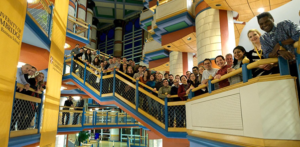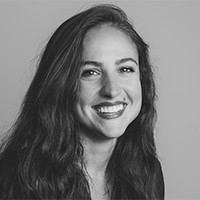
The Choral Hub mission
The Choral Hub is a platform whose mission is to get the whole world singing again. Here at TCH, we believe in the power of the human voice. “I’m tone deaf!” “I can’t sing.” “I hate the sound of my own voice.” We’ve heard it all, and so we know you might not believe us when we say that we think everyone can sing. In fact, singing is one of the earliest ways humans evolved to communicate and share histories and that’s why we believe that it’s something that’s born into us. Helping people find confidence in their voice is our most important first task.
So, we’ve built an app called Tchzant (launching in 2021) to support you on your singing journey, regardless of experience. One of our goals is to help you improve and nurture your own unique voice. We want you to find joy in singing whether you do it at home, in your car while driving or when you hum your new favourite song to your pet. We want you to start feeling just a little more confident every day.
All it takes is practice.
In addition to our app, our hub includes blog articles about singing, exploring its mental and physical health benefits and how it can form closer bonds between us humans. Our hub focuses on fostering and nurturing our community of singers which is why we’re all here really – the inspiring effect of listening to a homegrown artist just… do their thing. Singing is a powerful tool that we all have within reach. That’s why it is our goal to get the whole world singing again.
My name is Xann and I’m one of the Co-Founders of Choral Hub. In this article, I will shed a little light on the lessons I learned in the early-stage startup process, the usefulness of the Accelerate Cambridge startup programme, and how the Santander Universities Project Award set us on the path to achieving our early successes.
Year 1 – The lessons learned
Something I often say when talking about the startup journey is “there are many ways to do a thing”. There is no cookie cutter way to build and run a startup, there is no special recipe, and you have to figure out what works for you and your own working style. For me, having been through the gamut several times now, the 3 things that I think are most important for a startup founder in the first 6 months of their journey are:
- Defining a product you can test, validate, and use as the driving force of your forward motion.
- Finding an experienced strategic advisor who can help you through the toughest hurdles but who can also help you see the big picture, who you trust and someone who believes in you and your unique vision. (If you can find several advisors who cover an array of disciplines, then even better!)
- Raising just enough money to validate your idea (for us it was 3 rolled out prototypes and a minimal team that got us there.)
From there, the journey will still be challenging but at least you’ll have a guiding light and support from several key angles.
I’d say that the biggest learning curve is understanding that you don’t have to reinvent the wheel. Even if your product is incredibly innovative, someone has run a business like yours. Even if your product isn’t particularly innovative but your approach is unique in style, someone has supported a project like yours. There is support out there for you no matter the project and I encourage you to spend some time finding it.
When you have passion but lack money or early validation, your greatest assets are those who have come before you. At the end of the day as a founder you need to primarily listen to your gut and your own intuition. If you can focus your energy on finding advisors who you trust, then the journey from A to B will feel a lot less daunting. Before you know it you’ll be at F and G and then H. You are not in this alone and the Cambridge community is an enormous and wonderful asset at your disposal. Use it! Reach out and find support whenever and wherever you need it. Other founders around you, people who have applied to the same grants, received advice from the same advisors, stories of those who have overcome similar adversities. Accelerate Cambridge just kicked off their 24th cohort, that’s 400 entrepreneurs in your network from day one.
Never stop asking questions and continue to find the support you need for the forward motion that will be necessary to get from early-stage startup to scaling startup.
Our journey with Accelerate Cambridge
Accelerate Cambridge is unique in that it supports startups spinning out of the University from ideation to seed raise (and beyond). Something that I’ve heard and seen a lot is “once a part of the Accelerate Community, always part of the Accelerate Cambridge community,” which is such a strong message. Startups grow at different speeds, raise different amounts, build products for different markets and require personalized support. Accelerate Cambridge does an excellent job creating parameters that allow you to get exactly what you need out of the program. It’s inspiring to see so many past founders come back and speak to new cohorts, encouraging them to stand tall on their unique journey.
For us, Accelerate has been an incredible sounding board for early concepts, first rounds of pitching and directional support on the early stages of our journey. A resounding theme of our first term on the program (May 2020), when we really didn’t even have a defined idea of what we wanted to build, the coaches on the program pushed me to answer 2 essential questions:
1. How are you going to get product-market fit validation?
2. What’s the least you need to raise to get that validation?
These two guiding lights not only gave me the early steer that I needed to define next steps but pushed me to do something, anything to be in the position to have actualized data that we could use to make real, informed decisions. For an early stage startup I think this is the best thing you can do in your first 3 months.
Support from Santander Universities
The Santander Universities Project Award was mentioned to us in our first week on the program, and if I’m being honest at first I thought how far can £3,500 actually get us? But if there’s one thing you can take out of this post, it’s that in fact, that starter cash support is exactly what you need to get the ball rolling. It was enough to get a super rough product to the market, and for us to raise our first small private funding round. That award really set us up for every other success we gained over the last nine months.
As founders, we need to get into the habit of always knowing what comes next and how much we need to get from A to B… and in the very early days, nothing more than exactly how much you need to get there (to the penny).
What do we hope to achieve in 5 years?
As early stage startup founders, it is our job to have vision but also be thoughtful of our journey. You have to be both in the “go big or go home” mindset whilst simultaneously being incredibly agile (and ideally a bit frugal). To be able to switch from seeing the whole forest to the wood of the trees.
What does that mean for Choral Hub? We want to be a beacon of support and inspiration for our singing community. In 5 years time, we aim to have developed a capable technology platform that ensures that, no matter how much experience you have, we have a nurturing aid for your vocal style and musical interest. As we scale, we always want our users to feel that our platform offers a personalised experience to suit them, both by giving them a rewarding in-app experience and helping them make human connections in the singing community.




Leave a Reply